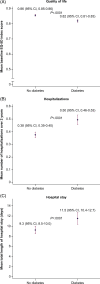Diabetes association with self-reported health, resource utilization, and prognosis post-myocardial infarction
- PMID: 33146924
- PMCID: PMC7724227
- DOI: 10.1002/clc.23476
Diabetes association with self-reported health, resource utilization, and prognosis post-myocardial infarction
Abstract
Background: Diabetes mellitus (DM) is associated with increased cardiovascular (CV) risk. We compared health-related quality of life (HRQoL), healthcare resource utilization (HRU), and clinical outcomes of stable post-myocardial infarction (MI) patients with and without DM.
Hypothesis: In post-MI patients, DM is associated with worse HRQoL, increased HRU, and worse clinical outcomes.
Methods: The prospective, observational long-term risk, clinical management, and healthcare Resource utilization of stable coronary artery disease study obtained data from 8968 patients aged ≥50 years 1 to 3 years post-MI (369 centers; 25 countries). Patients with ≥1 of the following risk factors were included: age ≥65 years, history of a second MI >1 year before enrollment, multivessel coronary artery disease, creatinine clearance ≥15 and <60 mL/min, and DM treated with medication. Self-reported health status was assessed at baseline, 1 and 2 years and converted to EQ-5D scores. The main outcome measures were baseline HRQoL and HRU during follow-up.
Results: DM at enrollment was 33% (2959 patients, 869 insulin treated). Mean baseline EQ-5D score (0.86 vs 0.82; P < .0001) was higher; mean number of hospitalizations (0.38 vs 0.50, P < .0001) and mean length of stay (LoS; 9.3 vs 11.5; P = .001) were lower in patients without vs with DM. All-cause death and the composite of CV death, MI, and stroke were significantly higher in DM patients, with adjusted 2-year rate ratios of 1.43 (P < .01) and 1.55 (P < .001), respectively.
Conclusions: Stable post-MI patients with DM (especially insulin treated) had poorer EQ-5D scores, higher hospitalization rates and LoS, and worse clinical outcomes vs those without DM. Strategies focusing specifically on this high-risk population should be developed to improve outcomes.
Trial registration: ClinicalTrials.gov: NCT01866904 (https://clinicaltrials.gov).
Keywords: cardiovascular events; diabetes; healthcare resource utilization; myocardial infarction; quality of life.
© 2020 The Authors. Clinical Cardiology published by Wiley Periodicals LLC.
Figures
References
-
- Unnikrishnan R, Pradeepa R, Joshi SR, Mohan V. Type 2 diabetes: demystifying the global epidemic. Diabetes. 2017;66:1432‐1442. - PubMed
-
- GBD 2016 DALYs and HALE Collaborators . Global, regional, and national disability‐adjusted life‐years (DALYs) for 333 diseases and injuries and healthy life expectancy (HALE) for 195 countries and territories, 1990–2016: a systematic analysis for the Global Burden of Disease Study 2016. Lancet. 2017;390:1260‐1344. - PMC - PubMed
-
- Rawshani A, Rawshani A, Franzén S, et al. Mortality and cardiovascular disease in type 1 and type 2 diabetes. N Engl J Med. 2017;376:1407‐1418. - PubMed
-
- Cavender MA, Steg PG, Smith SC Jr, et al. Impact of diabetes mellitus on hospitalization for heart failure, cardiovascular events, and death: outcomes at 4 years from the Reduction of Atherothrombosis for Continued Health (REACH) registry. Circulation. 2015;132:923‐931. - PubMed
Publication types
MeSH terms
Associated data
Grants and funding
LinkOut - more resources
Full Text Sources
Medical


